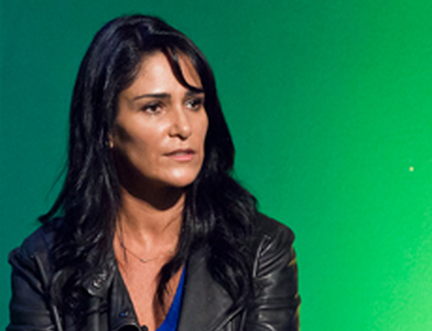More articles Sunday 26 August 2012 11:40am
Lydia Cacho shares the devastating details of a twenty first century slave trade

Mexican journalist and feminist Lydia Cacho offered a devastating account of the world trade in human trafficking at the Edinburgh International Book Festival yesterday.
Cacho, whose latest book, Slavery Inc., is a thoroughly researched account of the trafficking trade, began her talk with some bewildering statistics: ‘The UN Agency for Organised Crime reported on the anniversary of the abolition of slavery in America… that organised crime rings have sold three times the amount of slaves than when slavery was legal’. In fact Cacho calculated that slavery was worth an estimated $400 million a year and was recognised as being a more profitable market by gang and mafia leaders than trading drugs or guns: ‘One kilo of cocaine, you sell it once.’ An ex-human trafficker told Cacho from his prison cell, ‘a little girl you can sell it hundreds of times.’
Cacho’s story is one of remarkable courage and selflessness which earned her a standing ovation from the Book Festival audience. Whilst investigating the trade she has ‘dressed as a prostitute’ to infiltrate brothels, been chased by the Cambodian mafia, and even had to flee her own country after receiving vile death threats.
After the publication of her 2005 book El poder que protege a la pornografía infantil (The Demons of Eden: the power that protects child pornography) in which she named key players in the child pornography trade, she was arrested in her home city of Cancún and driven to Puebla on the opposite side of Mexico, a journey which consisted of being ‘tortured by the Mexican Mafia for 20 hours’.
After being held in prison for a year, refusing to denounce the evidence in the book or give away any of her sources, Cacho was finally released and six years later the leader of a child pornography ring exposed in Cacho’s book was arrested on sex trafficking charges and imprisoned for 120 years. But Cacho was keen to point out that this is just one man and that human trafficking, in particular sex trafficking, is now a global activity with suppliers simply providing what is being demanded by clients all over the world. ‘It’s devastating’ Cacho said, to see Westerners in South East Asia just walking past – or going into – brothels where children are clearly being used ‘and not doing anything about it.’
Cacho stated that ‘clients are creating new markets’: as policing tightens on clients and traffickers returning to the States from South East Asia, demand in the sex trade grows in under-observed Mexico. Indeed, in Cacho’s shelter alone (a shelter she set up to help the victims of violence in Mexico), around 30,000 women passed through its high-security doors just this year, and that is a mere fraction of the total number of people affected by the trade: ‘around 300,000 girls and women are sold every year in Mexico’ said Cacho.
Cacho predicted a bleak outlook for the future ‘We are going to regret celebrating the rise of China’ she said ‘so much of China’s economy has been built upon slave labour… their country has improved because they have exploited people’.
She also condemned the American military for their appalling exploitation of sex-trafficked women, referring to the ‘Green Beret’ system used by the United States military in Korea and Vietnam: ‘a green beret in the window of a brothel meant that there were young, virgin and clean prostitutes available.’ She emphasised that, even today, ‘most of the military in the world are investing in these kinds of brothels.’
On a final note however, Cacho praised the work of groups such as Amnesty International and PEN, who help to raise awareness about the stark, brutal and sad reality of human trafficking.
- 2025 Festival:
- 9-24 August
Latest News
 Communities Programme participants celebrate success of 2024
Communities Programme participants celebrate success of 2024



